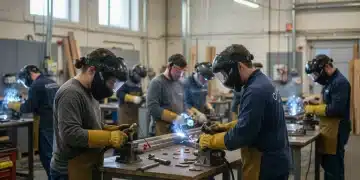The impact of AI on global employment: what you need to know

The impact of AI on global employment includes job automation replacing certain roles while simultaneously creating new opportunities in emerging fields, emphasizing the need for continuous learning and adaptation in the workforce.
The impact of AI on global employment is a topic that many are curious about, especially with rapid advancements in technology. How do you think these changes affect your career choices?
Understanding AI and its implications
Understanding AI is essential in today’s rapidly evolving technology landscape. From simple tasks to complex problem-solving, AI is reshaping how we interact with the world.
It’s important to consider what AI means for individuals and businesses alike. As machines become smarter, we need to evaluate both the benefits and the implications.
The Basics of AI
At its core, AI refers to the ability of machines to mimic human intelligence. This includes learning, reasoning, and self-correction. The main types of AI include:
- Narrow AI: Designed for specific tasks, like voice recognition.
- General AI: Theoretical and would perform any intellectual task a human can.
- Superintelligent AI: A future concept where AI surpasses human intelligence.
Each type of AI has unique characteristics and implications for employment. For instance, Narrow AI is already impacting sectors like customer service and manufacturing.
Potential Job Displacement
As AI systems take over routine tasks, there’s concern about job displacement. Jobs that involve repetitive actions are at greater risk. However, new roles are emerging.
It’s vital to adapt and reskill in order to stay relevant. Learning about AI and how to work alongside these technologies can create new opportunities.
In addition, understanding AI helps individuals make informed choices in their careers. Staying updated on technological advancements is crucial.
Benefits of AI Integration
Despite job displacement fears, AI brings numerous benefits:
- Increased Efficiency: Tasks that once took hours can be completed in minutes.
- Innovation: AI drives growth in various industries, creating new products and services.
- Enhanced Decision-Making: AI analyzes data quickly, supporting better business decisions.
Embracing AI can enhance productivity and lead to substantial economic growth. Understanding its role is key to navigating the future job market.
In conclusion, comprehending the implications of AI is important. It helps individuals and businesses strategize and prepare for the changes ahead. As we advance, staying proactive and informed will ensure we can leverage AI’s benefits while mitigating its challenges.
How AI is changing job roles
How AI is changing job roles is a critical conversation as we step into a new era of work. Understanding these shifts helps workers and businesses adapt to the evolving landscape.
A growing number of jobs now incorporate AI technologies. This affects not just the types of jobs available, but also how we approach our daily tasks.
Automation of Routine Tasks
Many job roles are beginning to see the automation of routine tasks. For instance, basic data entry tasks can now be completed by AI systems. This allows employees to focus on more complex responsibilities. The implication of this shift is significant.
- Reduced Time on Menial Tasks: Workers can spend less time on repetitive duties.
- Focus on Creative Problem Solving: With AI handling routine work, employees can engage more in critical thinking.
- Increased Job Satisfaction: Team members often feel more fulfilled when they tackle challenging tasks.
However, not all changes are positive. Some workers may find their roles shifting significantly or even becoming obsolete. It’s essential to retrain and adapt to remain competitive in the job market.
New Job Creation
On the flip side, AI is also creating new job roles. As technologies evolve, so do the skills required in the workforce. New opportunities are emerging, such as:
- AI Training Specialists: Experts who help train AI systems to perform specific tasks.
- Data Analysts: Professionals who interpret the data generated by AI algorithms.
- AI Ethics Managers: Individuals ensuring that AI is used responsibly and ethically.
These roles require different skill sets and knowledge areas, encouraging lifelong learning. Adapting to these changes can position workers favorably for the future job market.
Employers must also engage in upskilling and reskilling their staff. By providing training resources, they can help workers transition into new roles and enhance their productivity. Understanding the impact of AI on job functions enables companies to prepare better and manage transitions smoothly.
The industries most affected by AI

The industries most affected by AI are experiencing significant changes in how they operate. As AI technologies advance, various sectors are adapting to new methods and practices.
Several industries are embracing AI to improve efficiency and productivity, leading to transformational shifts. Examples of such industries include:
Healthcare
In healthcare, AI is revolutionizing patient care and diagnosis. Machine learning algorithms analyze medical data to help doctors make informed decisions.
- Predictive Analytics: Tools assess patient data to predict outcomes and personal treatment plans.
- Medical Imaging: AI analyzes images faster and often more accurately than human radiologists.
- Robotic Surgery: Robots assist surgeons, enhancing precision and reducing recovery time.
This integration of AI not only improves patient outcomes but also streamlines hospital operations.
Finance
The finance sector is also significantly impacted. Algorithms quickly process massive datasets, which allows firms to make quicker decisions.
Some uses of AI in finance include:
- Fraud Detection: AI systems identify unusual patterns and flag potential fraudulent activity.
- Risk Assessment: Automated tools evaluate risk factors for loans and investments.
- Customer Service: Chatbots assist customers around the clock, enhancing user experience.
Financial institutions are leveraging AI to improve security and customer satisfaction.
Manufacturing
Manufacturing is undergoing a transformation with the integration of smart technologies. AI streamlines production processes, making them more efficient.
Key impacts of AI on manufacturing include:
- Predictive Maintenance: AI predicts equipment failures before they occur, minimizing downtime.
- Supply Chain Optimization: AI analyzes data to enhance inventory management and logistics.
- Quality Control: Automated systems monitor product quality in real-time.
This leads to reduced costs and improved product quality.
As these industries adapt, it’s clear that AI will play a crucial role in their evolution.
Balancing automation and job creation
Balancing automation and job creation is a crucial topic as industries evolve with AI technologies. While automation improves efficiency, it raises questions about job security and opportunities.
It’s essential to understand that while AI can replace certain tasks, it can also create new roles that require different skills. This shift calls for a careful approach to manage both automation and job growth.
The Impact of Automation
Automation is changing the job landscape across various sectors. Tasks that were once performed by humans are increasingly handled by machines. This transition often results in:
- Increased Productivity: Companies can produce more goods at a faster rate.
- A Shift in Job Requirements: Many jobs now require advanced tech skills.
- Job Losses in Certain Areas: Positions that involve repetitive tasks are seeing declines.
As a result, workers in affected industries may need to seek training or transition to new roles that AI cannot easily replicate.
Creating New Opportunities
On the positive side, AI also opens doors for new job opportunities. As companies adopt new technologies, they need skilled workers to manage, develop, and maintain these systems. Some examples include:
- Data Scientists: Professionals who analyze data generated by AI systems.
- AI Developers: Individuals who design and improve AI algorithms.
- AI Trainers: Workers who help systems learn and improve through data.
These roles require specialized skills, emphasizing the need for ongoing education and training.
Balancing automation with job creation means that society must invest in education and training programs. This helps prepare the workforce for the changes to come. Businesses are encouraged to offer reskilling initiatives that empower current employees to adapt to new technologies.
Furthermore, collaboration between government, educational institutions, and industries is vital. Together, they can create pathways for workers to transition into new roles and ensure a smoother integration of AI into the workforce.
Future job trends in an AI-driven world
Future job trends in an AI-driven world highlight the ways technology will reshape careers. As AI continues to evolve, it will bring new opportunities and challenges for workers across all sectors.
The job market will be heavily influenced by automation and smart technologies. Certain roles will vanish, while others will emerge, leading to a dynamic shift in employment landscapes.
Emerging Roles
As AI systems become more integrated into businesses, we will see the rise of new job roles that focus on specialized skills. Some of these roles include:
- AI Ethicists: Professionals who ensure ethical practices in AI development.
- Machine Learning Specialists: Experts who develop and optimize algorithms for AI systems.
- Robotic Process Automation Analysts: Specialists who design and manage AI-driven workflows.
These positions will require a mix of technical expertise and problem-solving skills, emphasizing the need for workers to continuously adapt.
Soft Skills in Demand
In addition to technical roles, soft skills will become increasingly valuable. Skills such as communication, creativity, and emotional intelligence will be essential in a tech-driven workplace. As AI handles repetitive tasks, humans will need to focus on:
- Collaboration: Working effectively in teams will be crucial as industries adopt AI.
- Critical Thinking: Evaluating AI-generated data to make informed decisions.
- Adaptability: The ability to learn new technology and adjust to changing roles.
Employers will prioritize these skills, looking for candidates who can thrive in an evolving environment.
The Importance of Lifelong Learning
As the job market shifts, the importance of lifelong learning will grow. Workers will need to embrace continuous education to stay competitive. Many will seek out:
- Online Courses: Platforms offering training in AI and relevant technologies.
- Workshops: Opportunities to learn and develop new skills in a hands-on environment.
- Networking Events: Places to connect with industry professionals and stay updated on trends.
By committing to lifelong learning, workers can adapt to the future job landscape and leverage the benefits that AI offers.
In conclusion, the future job landscape will be profoundly influenced by AI technologies. While automation will replace some roles, it will also create new opportunities that require specialized skills and continuous learning. Workers will need to adapt by embracing both technical expertise and essential soft skills. Through lifelong learning and collaboration, individuals can thrive in this evolving environment, ensuring they remain valuable in an AI-driven world.
FAQ – Questions about the impact of AI on global employment
How will AI affect job availability in the future?
While AI may replace some jobs, it will also create new roles that require different skills, providing new opportunities for workers.
What are some emerging job roles due to AI?
New roles such as AI ethicists, machine learning specialists, and robotic process automation analysts are becoming important as industries adopt AI.
Why are soft skills important in an AI-driven job market?
Soft skills like collaboration, critical thinking, and adaptability will be essential as workers will need to complement AI technology with human insight.
How can workers prepare for the changes brought by AI?
Workers should embrace lifelong learning through courses and training to acquire new skills needed for emerging roles in a tech-driven environment.





